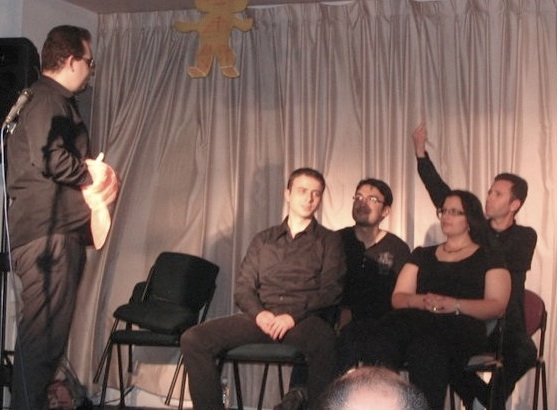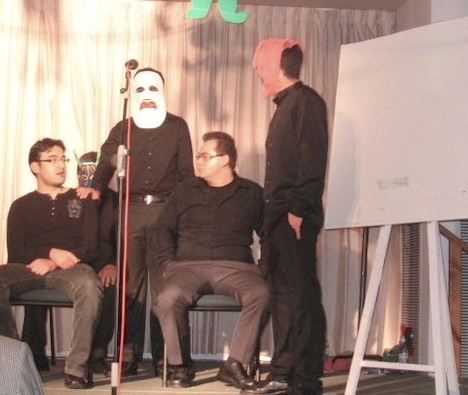
|
About the presenter: My name is Eliyahu [Eli] Avrahami. My professional education includes: MA (expressive Arts Therapy) from Lesley College; MSW from Yeshiva University; Ph.D. (psychology) from the City University of New York. For several years I have been an Adjunct professor at Haifa University (Israel) School of Social work. Currently I`m a therapist at the "Interdisciplinary Clinical Center", at Haifa University, and I have a private practice.During the last 5 years I facilitated workshops "psychodrama for stutterers" and currently, a Community Theater for stutterers. |

|
About the presenter: Eliyahu Dejourayev is 24 years old and lives in Tel-Aviv. He recently graduated with a Mechanical Engineering degree at the Technion - Israel Institute of Technology. Eliyahu is one of the players participating in the first project of its kind in the world, a community theater, which consists of people who stutter. Eliyahu tells about himself: "I stuttered since I can remember. At some point in my life I turned the stuttering into a positive tool that selects the people I include in my circle of close friends." |
A Community Theater activity and empowerment, among stutterers —
report, background description and personal experience
by Eliyahu Avrahami and Eliyahu Dejourayev
from Israel
About community Theater
This article describes a project that started in October 2010, in which, a group of ten people, all of which are stutterers, gathered to create a community theater activity. The group presented a one-act play, on March 2011 and June 2011. The project aims to perform a full, two-act play, in October 2011, close to the International Stuttering Awareness Day.
Community-theater puts emphasis on local and personal narratives - community members' narratives and the community's narrative. These narratives are shaped into a play through a process of improvisation, dialogues and discourse between the community members who participates in the activity, with the help of a facilitator/director, the actors. This activity aims to shape the narratives into a play that will be understood by the audience. The audience consists of other community members, and people outside the community. The Community-Theater characteristics are: (a) The play issues and concern are from and about the community, (b) the play is written with the language (slang, jargon) of the community, (c) the players are members of the community, and (d), the players contribute their narratives to the plot and content of the play.
Therapeutic-theater and community-theater share a common goal, change. This goal is achieved by community-theater via changing the individuals' and the group's narrative(s). Change can be attained and exhibited in one's social skills and roles, behaviors, awareness, belief system and emotions. Acquiring change, through the theatrical process, individuals and the community gain empowerment.
The community-theater's main goal is to enhance narratives of oppressed groups; to let their narrative be told. Doing so, a process of narrative change is expected, for example, from a narrative of being a "victim" to a narrative of "a person who has control over his/her life". This change means empowerment of the participants and the community members. Moreover, community-theater is an appropriate instrument to deal with conciliation between the community and the rest of the world.
The community Theater process
The project had started in October 2010, with eight participants, after four months of production and funding steps. Throughout the process a few left, and others joined the activity. By March 2011, nine actors were on stage, presenting act I of the play "Laughing is the one who is stammering at last."
The first five months were devoted to practice with theater games and improvisation. Special effort was given to enhance the participants' ability and confidence to step on the stage. In addition, techniques taken from psychodrama were adapted, as well as technique from "Playback Theater" to enhance the participants' improvisation ability. From these activities, the plot of the play emerged, focused on the participants' school experiences. For instance, one person recalled his inability to say "yes" during the name-check each morning. Another recalled that when the teacher asked questions, he always knew the answers, but he never dared to raise his hand because he didn't want to stutter. When the teacher asked him about any issue, he used to say "I don't know." A third person said that at recess in primary school, she didn't play with other children, because she was afraid that they would laugh at her speech.
The first act presents nine such stories, and the second was devoted to the audience's stories that were played by the participants in the playback theater's tradition. In addition, people from the audience were asked to share their feelings and thoughts regarding the play.
An important stage came a week after the show, when the participants gathered for sharing; talking about their experience during the play, and during the process that they experienced. Here we can find that the first goal, empowerment, had been accomplished.
Participants' experience and attaining the goals.
Two points were clearly exhibited during the sharing discussion. First, the participants found out that they can stand on a stage and speak up. This was stated and described by them in terms of "out of the closet" action!
 It was the process that gave them the courage to step on a real stage, in front of real audience, and speak out. "No longer," said one of the group, "will I hesitate to speak, no matter how much I stutter." Another mentioned that he was proud to belong to the stutterers' community.
It was the process that gave them the courage to step on a real stage, in front of real audience, and speak out. "No longer," said one of the group, "will I hesitate to speak, no matter how much I stutter." Another mentioned that he was proud to belong to the stutterers' community.
The second point refers to their experience as children when their parents were ashamed of having a child who stuttered and took them to a speech therapist to "repair" the child. In some cases, parents made an effort to take the child for treatment and were angry when the little child didn't "pay-back" by stopping his "malfunctioning" speech soon after the first therapy session. Now, after the performance, they stated, in different ways, that they felt they were going to be (or needed to be) fixed. "I accept myself as I am, with my stuttering, and I'm not going to change it," was a common voice among the group.
These points suggest that the participants experienced an empowerment - the main goal of any community theater. Moreover, this empowerment spread out over the audience. During the second act, people from the audience, stutterers, stepped on the stage, in front of the audience, and told their experiences as persons who stutter. They also mentioned that watching the performance, gave them the courage, at the first time in their life, to speak in front of so many strangers-people.
My personal experience My name is Eli Dejourayev and I am one of the actors participating in the show theater mentioned above. Stuttering entered my life at the age of 7 or at least that's what my mother says. For me the stuttering was always there; I don't remember myself without it. It would go with me everywhere I went. After a while I acted as one who doesn't care about his stuttering, but deep down inside I had a clear goal to get rid of it and the sooner, the better.
During my last year as a student I ran into a theater group of about ten people, all of them stutterers. Acting and stuttering? It seemed fictional yet alluring, so I decided to contact the group and have a look-see. I met one of the participants at the bus station. Suddenly, I found myself for the first time talking with a "stuttering colleague". We arrived to the rehearsal hall. There I met the rest of the cast and could hardly believe there were so many stutterers around me. Surprisingly, the knowledge that everyone has the same problem suppressed me, so I wanted to stutter in order to show the others that I was part of their group. That was the first time I tried to stutter in order to feel that I belonged.
The first activity in the rehearsals was always a warm-up. This activity includes walking in the room at different speeds while changing direction at every clap, pronunciation of syllables while walking, repeating sentences while making funny physical gestures, pushing walls, imitating a member of a group or a certain emotion and basically anything that leads to relaxation.
After each warm-up the energies in the rehearsal hall become really good and you can feel the actors getting closer to each other. Moreover, this activity helped me to break my social barriers on my first day. The essence of doing something together creates a feeling of a group, a feeling of union. This feeling began on the first day and accompanied me throughout the entire period.
After the warm-up we worked on the play. One of the players shared a personal experience with the group, where the main issue was stuttering. Then the players tried to turn the words into a powerful and alive experience. During the "revival" of the picture, the whole team offered ideas to empower the feeling received from the story. I think that this was another act that increased the sense of togetherness since quite a few times I found myself identifying with the stories of my teammates. Although I knew I wasn't the sole stutterer in the world, just hearing my friends' stories made me actually feel that I'm not the only one with this kind of a problem. The identification with other people's personal experiences brought me a sense of security and I began to realize that I'm part of an amazing group of people who share the same problems and life situations on a daily basis.
At one of the meetings I brought up my story: "At school, when the  teacher asked questions, I knew the answers but I didn't answer. The teacher asked other students, but they failed to answer, while my mind shouted the answer! The moment the teacher asked me, I froze. I tried to throw the answer out or even scream, but nothing helped as if someone took away my voice. After several attempts, glances and giggles from my classmates I gave up and said 'I don't know.'"
teacher asked questions, I knew the answers but I didn't answer. The teacher asked other students, but they failed to answer, while my mind shouted the answer! The moment the teacher asked me, I froze. I tried to throw the answer out or even scream, but nothing helped as if someone took away my voice. After several attempts, glances and giggles from my classmates I gave up and said 'I don't know.'"
When we began the process of reviving the above story, I had to choose who would play each of the characters - "me", "teacher", "student A" etc.. While viewing my story being enacted by the group, I had a flashback of my classmates' glances, the teacher's expectation for an answer and my helplessness. It was as if I went back in time. At first, it was very emotional - seeing and feeling it all over again just as if it was happening then. But slowly I felt acceptance and empowerment; I saw the contrast between my present life as an under-graduate student and my past life as a shy and introverted kid. Moreover, I feel that just by repeating the painful scene over and over made me accept myself. This has also been reflected in my personal life since today I venture to ask and answer questions despite my stuttering. Although in the past I did it too, now the fear is nearly gone since each question and answer seems to me like another rehearsal of the scene. Even though it's not the purpose of the stutterers' theater, once the fear to talk in class decreased, the stuttering diminished with it.
Similar to the way I identified with the other's personal stories, they identified with mine. With each personal story shared, the relationships between the players, became much deeper than just a "stuttering colleagues" link. When a group of people share similar situations in everyday life, they identify with each other on a higher level, and want to help themselves so they can help others. Being part of this amazing group of people, while trying to help them and listen to their struggles and conflicts, helped me to accept myself as I am and continue the transformation from being an ashamed stutterer to a proud one.
On the 10th of March we put on the first performance. A short outline of a script was written to enable us, the actors, improvisational freedom in choosing sentences. The excitement was at its peak when many people showed up. Only then I began to understand what we had done in recent months. When it was show time, Aryeh - one of the participants - approached the microphone and tried to speak. Radio silence. . . all of us crossed fingers. After a few suspenseful seconds that seemed like an eternity, he started the show and from there on everything just flowed. During the presentation I felt empowered. Who thought that I could go on the stage, speak in front of a foreign audience and just perform? These feelings accompanied all of us and created a unique atmosphere in the hall. At the break many people approached us saying we were courageous and that the show was very emotional. All this positive feedback gave me a huge boost of confidence. I felt that nothing could stop me. Nothing!
After the break there was an open stage, where the audience, some of whom stuttered, stepped on the stage and talked. I decided to join them. Did I? A kid who had once feared to talk in class decided to stand alone on a stage in front of dozens of people?! I didn't believe it. I shared my feelings with the audience and declared: "I am really proud to belong to the stutterers' community."

SUBMITTED: September 5, 2011
Return to original language with "show original" button at top left.